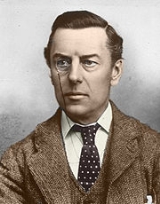
Joseph Chamberlain
Joseph Chamberlain was a British statesman of the Liberal party and then of the Liberal Unionist party.
Sourced
- During the last 100 years, the House of Lords has never contributed one iota to popular liberties or popular freedom, or done anything to advance the common weal; but during that time it has protected every abuse and sheltered every privilege.
- Speech at Birmingham, 4th August 1884. Cited in "The House of Lords: A handbook for Liberal speakers, writers and workers" (Liberal Publication Department, 1910), p. 96.
- The great problem of our civilization is still unsolved. We have to account for and grapple with the mass of misery and destitution in our midst, co-existent as it is with the evidence of abundant wealth and teeming prosperity. It is a problem which some men would put aside by reference to the eternal laws of supply and demand, to the necessity of freedom of contract, and to the sanctity of every private right of property...Our object is the elevation of the poor, of the masses of the people—a levelling up of them by which we shall do something to remove the excessive inequality in social life.
- Speech on 8 September, 1885.
- I venture to claim two qualifications for the great office which I hold, which to my mind, without making invidious distinctions, is one of the most important that can be held by any Englishman; and those qualifications are that in the first place I believe in the British Empire, and in the second place I believe in the British race. I believe that the British race is the greatest of the governing races that the world has ever seen.
- Speech given to the Imperial Institute on 11 November, 1895.
- 'Mr. Chamberlain On The Australian Colonies', The Times (12 November, 1895), p. 6.
- Let it be our endeavour, let it be our task, to keep alight the torch of imperial patriotism, to hold fast the affection and the confidence of our kinsmen across the seas; so that in every vicissitude of fortune the British Empire may present an unbroken front to all her foes, and may carry on even to distant ages the glorious traditions of the British flag.
- Speech entitled 'The True Conception of Empire' to the Royal Colonial Institute (31 March, 1897).
- Sugar is gone; silk has gone; iron is threatened; wool is threatened; cotton will go! How long are you going to stand it? At the present moment these industries...are like sheep in a field.
- Speech at Greenock on Free Trade (1903).
- [Social legislation] raised the cost of production; and what can be more illogical than to raise the cost of production in the country and then to allow the products of other countries which are not surrounded by any similar legislation, which are free from any similar cost and expenditure—freely to enter our country in competition with our own goods...If these foreign goods come in cheaper, one of two things must follow...either you will take lower wages or you will lose your work.
- Speech on Free Trade (6 October, 1903).
- London is the clearing-house of the world.
- Speech at Guildhall, London, Jan. 19, 1904.
- The day of small nations has passed away; the day of Empires has come.
- Speech at Birmingham, May 13, 1904.
- You are suffering from the unrestricted imports of cheaper goods. You are suffering also from the unrestricted immigration of the people who make these goods...The evils of this immigration have increased during recent years. And behind those people who have already reached these shores, remember there are millions of the same kind who, under easily conceivable circumstances, might follow in their track, and might invade this country in a way and to an extent of which few people have at present any conception...But the party of free importers is against any reform. How could they be otherwise? They are perfectly consistent. If sweated goods are to be allowed in this country without restriction, why not the people who make them? Where is the difference? There is no difference either in the principle or in the results. It all comes to the same thing - less labour for the British working man.
- Speech in Limehouse in the East End of London (December 1904.)
- There are men in the House of Commons who profess in a special sense to be the representatives of labour, who would not allow me, who represented a great working class constituency...the claim to represent you. In order to do that, according to their theories, I should have to be a man who did some work thirty years ago, and never did any after...it is these men who are at this time blackening the character of those who are upholding the British dominions and the British flag throughout the world...They have no word of sympathy for the men who suffer for the Imperial cause...But one thing I will say, and I say it in your name: these men do not represent the working classes of England, and never yet in our history of the British race, has the great democracy been unpatriotic.
- On the Labour Party (7th July, 1906.)
